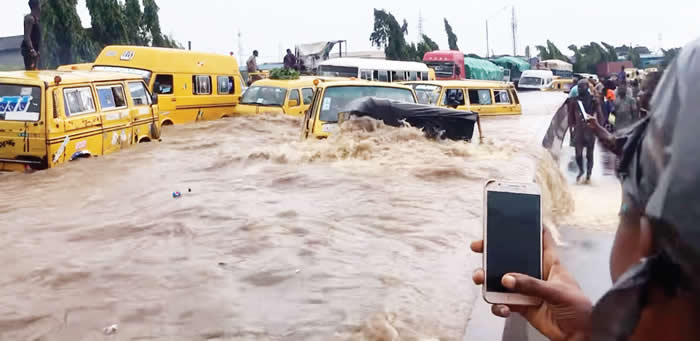Persistent flooding continues to plague Nigeria, as environmentalists pointing to bad roads and poor drainage channels as primary culprits.
Recall that the Annual Flood Outlook by the Nigeria Hydrological Services Agency released in April, Lagos, Adamawa, Imo, Ogun, Oyo, Rivers and 25 other states would experience flooding during the rainy season.
For instance, Lagos State, Nigeria’s bustling economic hub, has been struggling with rising waters during its rainy season, causing significant disruption to daily life and economic activities.
The heavy downpour that occurred on Wednesday, the 3rd of July, 2024, led to flooding in almost every LGA of Lagos State, restricting movement and claiming lives, as a primary six pupil was reportedly swept away by the flood in the Ikosi-Ketu Area of the state and a yet-to-be-identified 61-year-old man who lost his life after being electrocuted during the flood incident.
A resident at Goodnews Estate, Sangotedo, Lagos State, Pastor Monday Ojumah said the main reason for the flood was as a result of bad roads and poor drainage channels.
“The roads are bad, there are a lot of potholes on our roads. Also, the island is one way in and one way out, no alternative roads, hence the reason for the traffic, which gets worse when it rains. To worsen the situation, our major roads do not have proper drainage channels,” Ojumah explained.
He however appealed to government to come to their aid. “Lagos Island needs proper house planning and good roads with proper drainage channels,” he added.
“A major reason why we are having flooding in some part of Nigeria is because the topography in that axis is low and the water ways have not been adequately channelised and the drainages are not wide enough to contain the volume of water that is flowing on the roads. The drainages have to be wide, so that the water can adequately flow,” the associate research professor of Climate Change and Environmental Education, Lagos State University (LASU), Dr. Michael Ahove said.
In his reaction, the Lagos state commissioner of Environment and Water Resources, Tokunbo Wahab, at Channels Television’s The Morning Brief, affirmed that the flooding was as a result of nature taking its course, even as he disclosed that the state had deployed teams across the city to manage the floods and mitigate its impact.
Dr Ahove recommended that state governments should put more efforts in channelising and widening the water ways in their various states.





